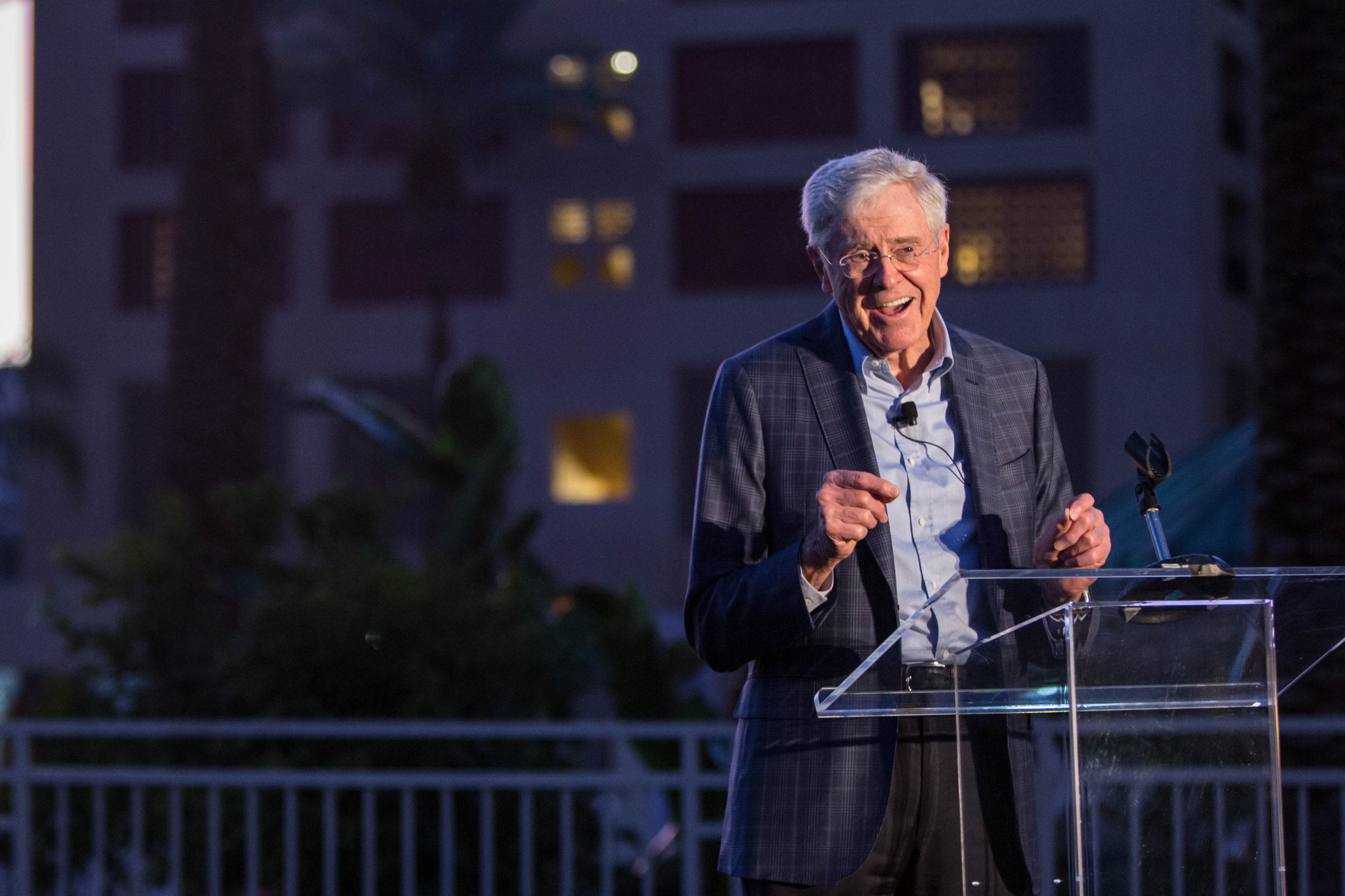
If you want to understand the Koch brothers’ influence and ambition, consider the lineup they attracted to a conference on inner-city violence: Arch-conservative Texas Sen. Ted Cruz, the rapper Scarface and John Carlos, an Olympic medal winner who gave a Black Power salute from the podium.
Though the political and policy network backed by billionaires Charles and David Koch is better known for its work backing Republican candidates for office, it also syncs up with affiliates like Urban Specialists to advocate on a wide range of issues such as criminal justice reform, gang prevention and job training.
“Long term, we need to cohesively focus on the big ideas,” says Randy Kendrick, a longtime Koch ally whose family owns the Arizona Diamondbacks. Over a three-hour meeting in Arizona in recent weeks, the point men for K-12 education briefed her about their plans for the next few years of advocacy for children and secured her commitment. “They’re looking at it in a very strategic overall way,” says Kendrick, a self-described policy maven who serves on the board of the conservative Goldwater Institute. “Thank God. Our children deserve that.”
The sprawling Koch network spent $20 million to shepherd the Republicans’ tax cuts into law last year and are prepared to spend another $20 million on ads and events to make it less unpopular with voters. All told, they’re eyeing as much as $400 million to shape the policy and political conversations heading into the fall’s midterm elections.
But it is also spreading its wings into other areas. The criminal justice system is among its most known priorities that cut across political lines, along with scholarships for students at historically black colleges and universities. The groups also are funding job-training programs in Chicago, an addiction-recovery program rooted in Cross Fit and based in Denver, and anti-gang efforts that brought together the unlikely panel on Martin Luther King Jr. Day in Dallas.
“We all need to be fully committed to a society in which everybody has an opportunity to make a better life for themselves. That’s what we’re about,” Charles Koch said.
With 2018’s midterm elections looming with plenty of pitfalls for Republicans, much of the three-day retreat for donors near Palm Springs focused on civil society programs. “Let’s be frank right upfront: These elections are going to be brutally tough,” Americans for Prosperity CEO Emily Seidel told guests. “So what are we going to do about it? We’ve never faced a challenge like this one.”
So many of the most enthusiastic conversations stemmed from conversations about how the Koch-backed network could change communities.
“I hate to quote Hillary Clinton, but it takes a village,” said Jill Lynch, whose family owns an Iowa agriculture firm.
These programs break against the images of the Koch brothers as political villains. (Former Senate Democratic Leader Harry Reid called them “oligarchs” during one of his many speeches against them on the Senate floor.) And that’s part of the point: the Koch brothers network has long insisted that it dallies in politics as a means to push policy.
Consider that stage that brought together Cruz, Scarface and Carlos on Martin Luther King Jr. Day. Each arrived to share his experiences and ideas for fighting what they broadly called inner-city violence. The organizers, the Koch-backed Urban Specialists, focus on preventing crime, keeping young people from joining gangs and, in founder Bishop Omar Jahwar’s words, “reforming urban culture.”
“Instead of division, this event was a powerful example of bringing people together. I mean, who hosts an event like this? This network does,” said Evan Feinberg, who leads the venture-philanthropy arm of the Koch network dedicated to such out-of-the-box funding. “The opportunity to work with folks that might disagree with our Seminar Network on all kinds of issues coming together in common cause to solve common problems is an exciting part of what we’re doing.”
The experiment in cultural shifts has clearly captured donors’ imagination, perhaps as a smarter investment than politics this year. For instance, Tom Shepherd had focused on schools and education for years, including one charity that teaches poor kids to play squash, but is now considering how he might add changes to the criminal justice system to his giving. “It’s one of the issues I’ve been woke to,” the material scientist with businesses in Cincinnati. “It’s about communities and helping people come out of poverty and breaking down barriers.”
The ambition, however, is on shaky ground. “Have we just bitten off more than we can chew?” network adviser Lauren McCann asked Charles Koch rhetorically during one session, giving voice to a worry many privately harbor.
Koch knew the pushback. “If we aren’t involved in all of these, how can we be successful?” he said. “These problems cross over all the dimensions in society. If you just deal with one or two, we are not going to make progress. We have to be effective in dealing with all of them.”
The Kochs convene these summits twice a year, usually at resorts that are heavily secured and exclusive to donors who pony up at least $100,000. Reporters are invited to attend some sessions if they agree not to identify donors who wish their patronage to remain private.
(Disclosure: Time Inc., TIME’s parent company, has agreed to be acquired by Meredith Corp. in a deal partially financed by Koch Equity Development, a subsidiary of Koch Industries Inc.)
More Must-Reads from TIME
- Cybersecurity Experts Are Sounding the Alarm on DOGE
- Meet the 2025 Women of the Year
- The Harsh Truth About Disability Inclusion
- Why Do More Young Adults Have Cancer?
- Colman Domingo Leads With Radical Love
- How to Get Better at Doing Things Alone
- Michelle Zauner Stares Down the Darkness
Write to Philip Elliott / Indian Wells, Calif. at philip.elliott@time.com